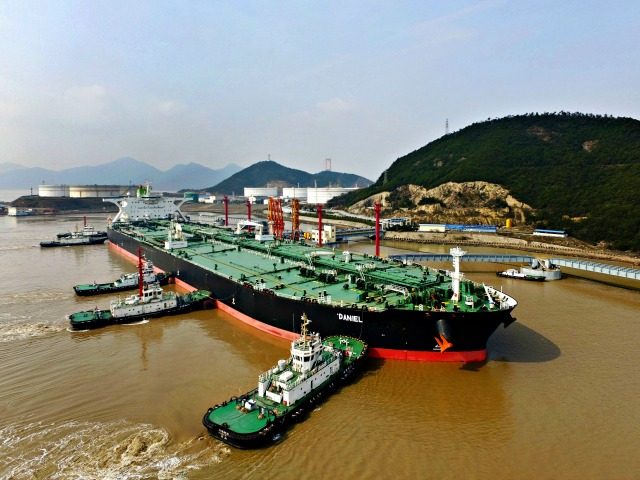Some advisers within U.S. President Donald Trump’s administration are allegedly urging secondary economic restrictions on Beijing for continuing to import Iranian oil despite American sanctions against the purchase, Politico reported this week, citing anonymous U.S. officials.
The news outlet acknowledged that additional restrictions on the Asian giant could further complicate the ongoing trade talks between China and the United States and further intensified tensions between the two largest economies of the world.
Politico notes:
Senior administration officials now agree that China defied U.S. sanctions when it imported more than a million barrels of crude oil from Iran last month. But they are grappling with whether — and how — to hit back, according to three U.S. officials.
The State Department had considered issuing a waiver allowing Chinese companies to receive Iranian oil as payment in kind for their investment in an Iranian oil field, but that idea has been abandoned. China hawks on the National Security Council are now pushing for the U.S. to impose secondary sanctions on Chinese entities, a move that would complicate trade talks between the two countries and further strain the relationship.
After pulling the U.S. out of the controversial nuclear deal between Iran and U.S.-led world powers, including China, arguing that it was not tough enough, the Trump administration reimposed the suspended economic restrictions in addition to new sanctions, targeting the oil, gas, shipping, and banking sectors, among others. The multifaceted effort is part of an unprecedented maximum pressure campaign to convince Iran to negotiate a new accord in exchange for much-needed economic relief.
Initially, President Trump granted temporary sanction waivers to Iran’s eight biggest customers — China, India, Italy, Greece, Japan, South Korea, Taiwan, and Turkey — to ensure the restrictions do not destabilize crude oil prices. However, the Trump administration announced an end to the waivers in April, warning them to stop purchasing oil from Iran by the beginning of May or face additional sanctions.
China and its rival India, both home to swelling populations and the top two importers of Iranian oil, respectively, are reportedly expected to remain defiant amid the threat of U.S. sanctions given their substantial reliance on Tehran’s crude.
Already, China is continuing to import Iranian crude oil in the face of the American sanctions.
In June, the Financial Times reported:
China is buying Iranian oil in defiance of US sanctions and providing what Tehran hopes will be a financial lifeline for the country’s buckling economy. Although Beijing customs data show crude purchases from Iran are down month-on-month, China is still importing Tehran’s oil despite US measures designed to cut exports to “zero”. Last week the Chinese received their first delivery of an Iranian oil cargo since the Trump administration in May scrapped exemptions on Iranian sanctions.
Boasting about its capability to circumvent long-term U.S. sanctions, Iran claims the United States is unable to prevent it from exporting its oil. Iran has threatened to blockade the Persian Gulf over the Trump sanctions to ensure that if they cannot transport oil, no oil moves through the region. The Persian Gulf is one of the most contested waterways through which an estimated 20 percent of the world’s tradeable oil passes on a daily basis.
Last month, the United States and Saudi Arabia accused Iran of attacking foreign vessels — a Japanese and a Norwegian tanker — on the Strait of Hormuz, considered one of the most strategically important, crowded, and contested waterways in the world where the vast majority of oil from the Persian Gulf moves through.
Overnight on Wednesday, the U.K. Royal Navy thwarted an attempt by three boats from the Islamic Revolutionary Guard Corps, a U.S.-designated terrorist organization, from seizing British tanker.
The following day a still defiant Iran, hours after it was forced to withdraw when the British warship pointed its deck guns and issued verbal warnings, claimed none of Tehran’s enemies dare fire a “single bullet” at Iran, the state-run Tasnim News Agency reported.
In February 2018, the U.S. military warned that the lifting of sanctions under the controversial nuclear deal between Iran and United States-led world powers, including China, allowed Beijing to enhance its relationship with Iran, designated by the Trump administration as the world’s leading state-sponsor of terrorism.
China’s ambitious infrastructure and technology Belt and Road Initiative (BRI), considered a threat by the United States, is expected to run through Iran.
Brian Hook, the U.S. Special Representative for Iran, told lawmakers last month that Trump’s maximum pressure campaign against Iran is “working,” noting that it has reduced Tehran’s ability to boost its military capabilities and fund its proxies, including anti-America Shiite militias in Iraq, home to thousands of U.S. troops, and the narco-terrorist organization Hezbollah, which operates in the Western Hemisphere.
Hook recently said the Trump administration’s sanctions are “on track” to deprive Iran of $50 billion in oil revenue alone.

COMMENTS
Please let us know if you're having issues with commenting.